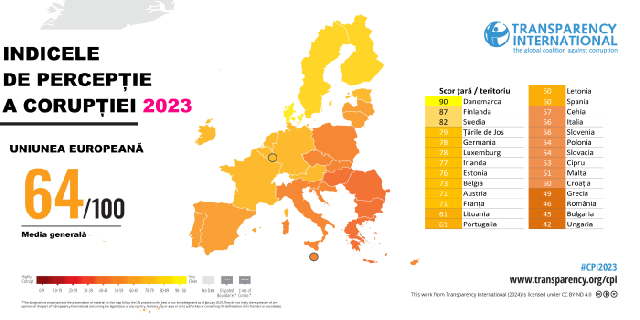Corruption Perceptions Index 2023
Romania continues to be one of the EU countries with poor results in fighting corruption.

Ştefan Stoica, 31.01.2024, 13:50
The Corruption Perceptions Index reflects how independent and business experts perceive corruption in the public sector in 180 states and territories. In a ranking drawn up by Transparency International by awarding points, from 0 to 100, where zero means very corrupt and 100 not corrupt at all, the continental and world champions are three Nordic states, Denmark, Finland and Norway, joined by New Zealand. Romania is ranked only on 63rd position, the same as last year. With 46 points, Romania is still among the European Union countries with the poorest results regarding the implementation of anti-corruption measures, which reflects significant deficiencies regarding the rule of law. Romania’s neighbors in the ranking and also geographically, Bulgaria and Hungary have 45 and 42 points respectively, being at the bottom of the ranking in terms of integrity. According to Transparency International, most states have made no progress at all or have made minimal progress in combating corruption in the public sector.
It’s essential to have independent, transparent, and resourceful legal authorities and institutions to be able to keep corruption under control, the organization believes. In many countries, including Romania, there is still a big gap between the provisions of the laws and the way in which they are implemented, Transparency International noted. Therefore, constant actions and measures are necessary to ensure both the improvement of anti-corruption mechanisms and the strengthening of integrity. For Romania, Transparency Internationals recommendations include updating the legislation in the field of public integrity, to bridge the gaps and correct legislative inconsistencies and improve the clarity of regulation in this area. The organization also recommends improving organizational and decision-making transparency, including through effective public consultations and easy access to information of public interest, the standardization and clarification of administrative procedures by adopting the Code of Administrative Procedure.
Also in the case of Romania, it would be necessary to adopt legislation that should clarify the status, career and efficiency of public administration employees, as well as the use of Integrity Pacts as a monitoring tool for public procurement, especially for procurement procedures and contracts with high risks for the occurrence of irregularities, integrity incidents or fraud. Transparency International reiterates the fact that there is a need for a constant involvement of all representatives of society, from the political class and institutions to the private environment and citizens, each having their own role and responsibility in strengthening public integrity. Transparency International recalls that it contributed to the establishment or consolidation of institutions with a major role in combating corruption and developed and implemented ethics and integrity standards for the public sector and the business environment. (LS)






























